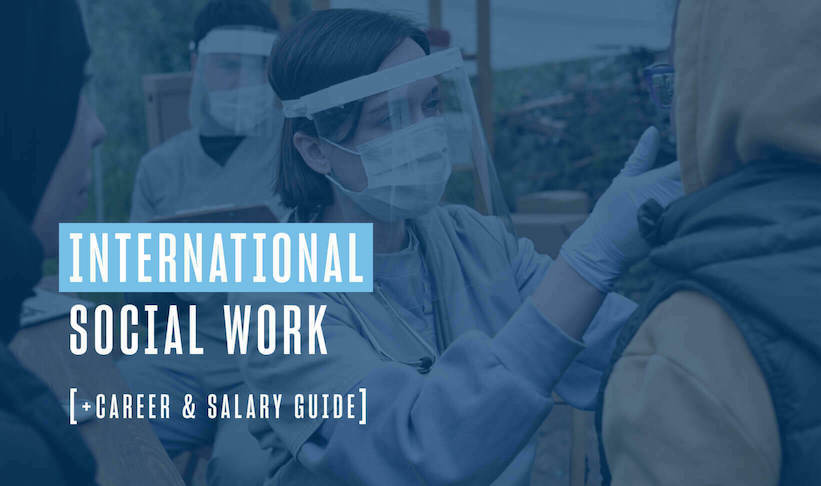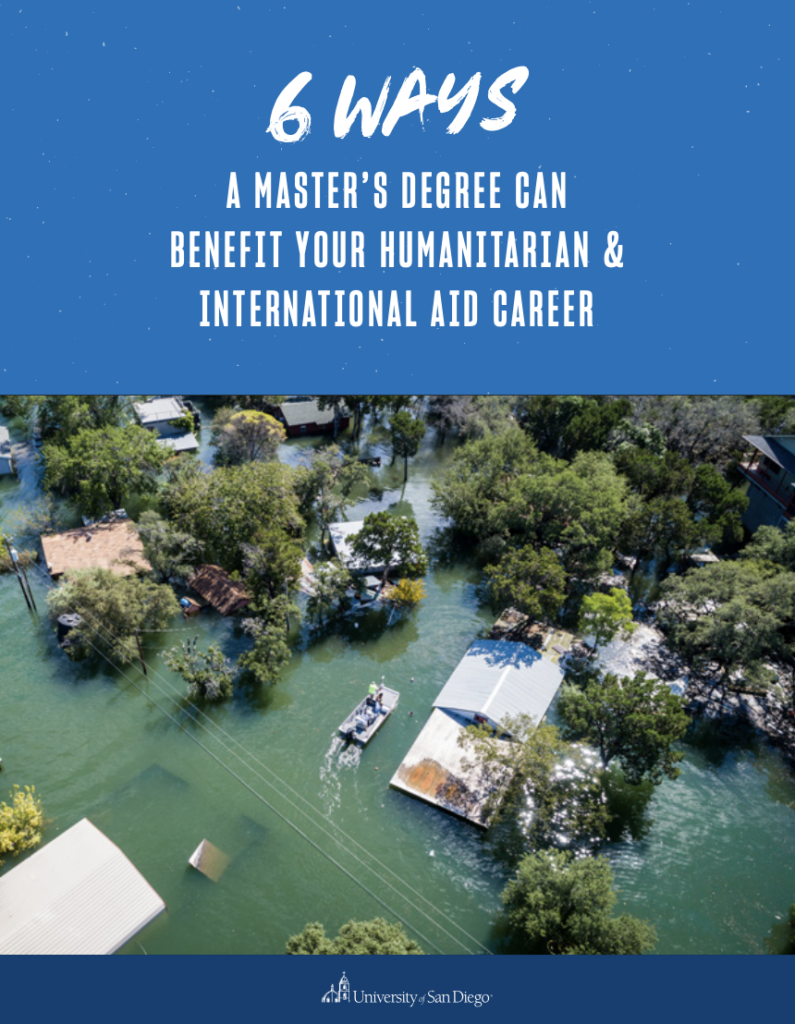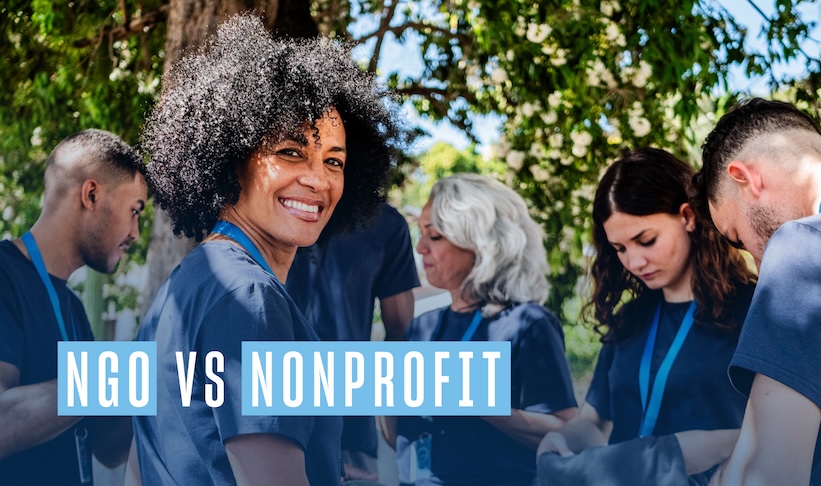Social work is a challenging yet rewarding career. There is a need for compassionate, knowledgeable leaders who are interested in helping others and ready and willing to use their skills and knowledge on a global scale.
International social workers are more than just skilled professionals or clinicians — they are valued humanitarians who are trained to help individuals and communities in need across the world.
Are you interested in rising to the challenge? Keep reading for our complete career guide on international social work, including salary information, typical responsibilities, common questions about the profession and potential organizations where you could work.
What Is International Social Work?
International social work is a practice in which trained professionals help disadvantaged or victimized individuals and communities around the world. One of the hallmarks of social work is its emphasis on human relations: it is often conducted between people, rather than via public policies, the media or technological interventions. People in these positions are often employed by international organizations and often deal with such critical issues as women’s rights, poverty, global health, food insecurity, social justice, abuse, sexual assault, refugee rights, HIV/AIDS, addiction, children’s issues and rights and mental health.
An international social worker is also considered a humanitarian — a person who expresses concern for others while promoting human welfare.
What Does an International Social Worker Do?
An international social worker provides help and support to individuals and offers aid to vulnerable populations who are facing challenges or hardships. They may also help train other humanitarians and are often called upon to help in the aftermath of a natural disaster or crisis.
Typical social work responsibilities include:
- Identifying those in need of assistance
- Assessing the support networks needed
- Helping individuals adjust to changes and challenges
- Researching and advocating for community resources
- Responding to crisis situations
There are also different types of social work — public health, mental health, advocacy and medical, to name a few.
International Social Worker Salary
The salary for this position will depend on the organization or company you work for, in addition to where you are located and how much experience is required. Indeed, the U.S. Bureau of Labor Statistics and ZipRecruiter offer salary amounts ranging from approximately $55,000 to $70,000+ per year. Please note that salary information will fluctuate in real time due to changing data and will imply different purchasing power depending on what country you are living and working in.
Companies Hiring
While you can find positions on popular job resources such as LinkedIn and Indeed, there are sites specifically dedicated to humanitarian-related work, such as ReliefWeb, Idealist and Devex. There are many national and global organizations looking to hire skilled international social workers, though you’ll find that most listed positions are local and specific to certain geographic regions, cities or communities. Here is just a sample of companies hiring for these types of positions:
- Boys & Girls Clubs
- CARE
- Catholic Relief Services
- International Federation of Red Cross and Red Crescent Societies (IFRC)
- International Medical Corps
- International Rescue Committee
- Mercy Corps
- Refugees International
- Save the Children
- UNICEF
- UNHCR
- U.S. Bureau of Population, Refugees, and Migration
- U.S. Committee for Refugees and Immigrants
- World Vision
- YMCA
- YWCA
It’s important to note that international social workers may also work within the United States, depending on the organization, company or position.
Skills Needed
Social work is a career that requires mental and emotional stamina. In addition to the right type of education and certification, you must be able to balance empathy, patience, communication and professionalism in situations that are often troublesome and challenging.
Additional skills and characteristics needed to succeed in social work include:
- Active listening
- Advocacy
- Boundary setting
- Critical thinking
- Cultural competency
- Emotional intelligence
- Leadership
- Organization
- Patience
Being an international social worker, however, also means developing and maintaining humanitarian-related skills such as:
- Ability to speak a second language (or multiple languages)
- An understanding of global issues
- Ability to cope with high levels of stress
- Willingness to travel and work in less-than-ideal conditions
- Sensitivity toward other cultures
International Social Work Qualifications
A bachelor’s degree in social work is not required but can help with entry into a master’s degree program. Other relevant undergraduate degrees include psychology, political science, women’s studies, gender studies, sociology and international studies.
In most cases, a master’s degree is required, and the bachelor’s and/or master’s degree must be from a program accredited by the Council on Social Work Education. There are also two types of social work — clinical and non-clinical.
Clinical social workers provide immediate aid to individuals and families whereas non-clinical social workers help reform policy and work at the community level. The requirements for clinical social work are more stringent and typically require a master’s degree, clinical experience and a license from the state in which you intend to practice.
You may also consider supplementing your education with a humanitarian-related advanced degree, which can prepare you with the right knowledge, experience and tools to excel in this type of position.
Steps to Become an International Social Worker
If you’re interested in this type of rewarding humanitarian work, consider the following general guidelines and career advice:
- Invest in a relevant undergraduate and graduate degree.
Most positions require a minimum of a bachelor’s degree; many require some type of advanced education, especially if you are interested in clinical social work.
- Gain experience and make connections.
Volunteer opportunities and/or internships have the ability to provide hands-on experience, first-hand knowledge and meaningful connections that can bolster your resume and help you get a foot in the door.
- Pursue specialized training and education.
Consider relevant undergraduate and graduate degrees. International social workers may also want to supplement their education with humanitarian-related courses or programs.





![6 Nonprofit Careers [Job Titles, Salaries & Outlook Explained]](https://onlinedegrees.sandiego.edu/wp-content/uploads/2023/10/MSNP_Blog_6NPCareers-1024x576.png)